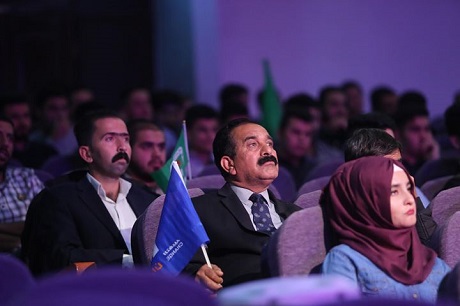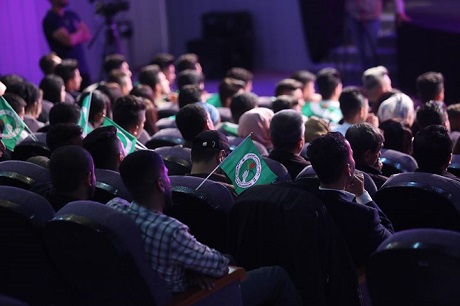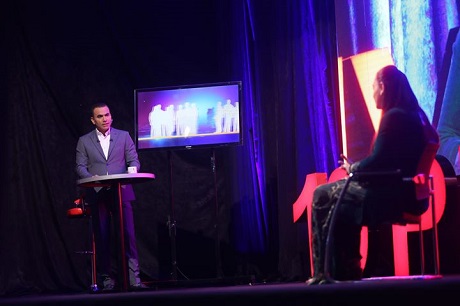SULAIMANI, Kurdistan Region – The Patriotic Union of Kurdistan (PUK) will draw inspiration from its rich history to stay relevant in Iraqi politics while combatting misconceptions about its role in the loss of Kirkuk, Jwan Ihsan, the head of the party's campaign in Sulaimani, said on Rudaw TV’s 10 Questions programme.
The party is struggling to form a united leadership after the death of its founder Jalal Talabani and the
loss of oil-rich Kirkuk, a PUK stronghold.
Some with the PUK’s senior leadership have expressed concern that they may lose votes – a position that Ihsan disagrees with.
"This time, the expectation by some parties is that the PUK’s performance will be weak. Certainly this will not happen. The Patriotic Union of Kurdistan remains the same strong force. We stand on stable lands. Our conviction comes from our history," she told a mixed audience of voters in Sulaimani.

undefined
Ihsan, 43, tops the PUK's ballot in Sulaimani province, which is shaping up to be a hotly contested electoral ground. She is a professor at the city's public university and holds a PhD in sociology. She is a member of the party's leadership, joining the PUK in 1991. In addition to Kurdish, she is fluent in English and Arabic.
Sulaimani has historically been a PUK stronghold since the Kurdish uprising in 1991, but it has also become home to several Kurdish opposition parties since at least the late 2000s. Gorran, formed by the PUK's then deputy head Nawshirwan Mustafa, won 25 seats in the 2009 Kurdistan elections and 24 seats in 2013, becoming the KRG's second largest party and pushing the PUK to third place for the first time.
This year, the party is also facing challenges from the newly-founded Coalition for Democracy and Justice (CDJ), headed by Barham Salih, former KRG prime minister and former PUK deputy head. The New Generation, founded by businessman-turned-politician Shaswar Abdulwahid, is also expected to put on a strong election campaign.
"We want to have a civil election campaign. This city belongs to all of us, all parties and views," Ihsan said, adding that the parties should act in a democratic spirit that corresponds to the city's title of culture capital of the Kurdistan Region.
Yadgar Jaf, a member of the PUK’s media office, said the party has learned from past election experiences.
"The current situation necessitates the need for a calm and peaceful atmosphere during the election campaign," Jaf said while sharing a ride with members of other parties during the Rudaw programme recorded in Sulaimani.
"It is the PUK's official stance that the use of strong language and clashes that were seen in the past were not in the interest of anyone. We should find common ground… it is the PUK's decision to avoid clashes with other parties," Jaf added.
The PUK will no longer use tactics marked by “strong language,” he said, such as previous claims of Gorran members fed up with the opposition party and returning to the PUK.

undefined
Yadgar Jaf [M] shares a ride with members f other parties during 10 Questions program presented by Ranj Sangawi [R].
Hadi Hama Rashid, a Gorran member, welcomed the PUK's new stance, but he remained critical of the PUK and the Kurdistan Democratic Party (KDP) – the traditionally ruling parties in the Kurdistan Region.
The two parties have failed to protect Kurdish rights in Baghdad, Rashid claimed.
The Kurdish parties have been divided after the independence referendum and the subsequent loss of the disputed areas.
"October 16 is an unwanted situation," the PUK’s Jaf said. He blamed a “media campaign” that is trying to portray the party as giving Kirkuk to Baghdad.
Ihsan argued that it was wrong to blame the PUK alone for what went wrong that day.
"Why is that the October 16 events have been tagged exclusively to the PUK? Were we the only ruling party in Kurdistan and Iraq? Were there not other political parties? Were not these parties present among the Peshmerga? All the parties?” she asked.
“And has there not been a
demand to investigate this issue? Why is it not happening? Did not the parliament of Kurdistan ask for it? Did not the Patriotic Union of Kurdistan itself ask for it to be investigated?"
Ihsan said that Kurdish parties should shoulder their collective responsibility for what went wrong.
She said the KDP is responsible for "
selling out" the Yezidi area of Shingal both in 2014 when ISIS attacked and then when Iraqi forces took over last October.
In Kirkuk, she said the Iraqi forces outweighed the Peshmerga and posited that if the Kurdish forces had fought, the city would have suffered the same fate as Afrin which fell to Turkish forces after two months of conflict.
Both the KDP and the PUK have strong influence over the Peshmerga and should be fairly judged, she said.
Gorran’s Rashid said that while the PUK and KDP have disputed and blame each other, they always unite in the end.
"It is a fact that the PUK and the KDP try to appease one another so that they can protect their own interests in Baghdad," he said.
He blamed the two parties for dividing Kurdistan, accusing both of treason.
"Nobody is prepared to meet with the PUK and the KDP following treasons committed," he said.
The Kurdistan Islamic Union (KIU), another Kurdish opposition party, encouraged all sides to leave some room for a united Kurdish front following the election, said party member Hawre Qadir.
"It is okay for the Kurdish parties to hold different views. But they should learn not to tarnish the image of each another," he said, noting that sometimes Kurdish parties were so divided in Baghdad that about five months passed without them able to meet in one place.
The PUK’s Ihsan agreed that without a "united" front the Kurdish parties will have little or no role in the future Iraqi government.
Going ahead, Ihsan said, the Kurdish parties have no choice but to come together after the election, taking a united stance that should have already been put into place.
"The PUK cannot on its own form an alliance with another Iraqi party without other Kurdish parties," she said, adding the same is true for other parties.
The parties tried but failed to form a united election campaign for the Iraqi elections.
"It is alright for us to have separate lists in Kurdistan, but we should have had a joint list in the disputed areas," said the KIU’s Qadir.
The KDP is boycotting the election in Kirkuk claiming that it is under Iraqi occupation, a stance that the PUK candidate described as giving up on their historical responsibility.
"Why is it that the PUK protected Kirkuk, that it considers it as its own, while other parties have left Kirkuk again during the election campaign," she said.
Ihsan, having seen the party's roller coaster experience since 1991, including holding the post of first Kurdish president of the Republic of Iraq Jalal Talabani, said that she is optimistic the party will remain strong and united, encouraged by young supporters.
"How can you not be happy when you have such people," she said.

undefined
Quizzed by Rudaw’s Ranj Sangawi about the performance of the Iraqi Ministry of Human Rights, Ihsan said she was not satisfied with the actions of the ministry, especially considering human rights violations in Iraq since 2014 when the government of Prime Minister Haider al-Abadi was formed.

undefined
Ihsan declined to name the minister in her comments, at which point the presenter reminded her that the ministry has been dissolved under Abadi.
The exchange went viral on social media with some accusing Ihsan of ignorance of Iraqi politics because she did not appear to know the ministry no longer exists.
Ihsan issued a statement after the programme aired, stating that the Ministry had existed at the beginning but was then abolished as part of Abadi's reforms to decrease the number of ministries.
She claimed Rudaw had baited her into the exchange to provide fodder for social media.
"If a media intentionally disrespects a candidate of the martyrs' list, we will then let the PUK media feel free to strongly and firmly respond to such failed news reports," Ihsan said in a warning message, calling on media to act "professionally."
Editor’s note: 10 Questions is one of Rudaw TV's election specials. It invites candidates to answer questions from a mixed audience on issues that matter to the party and voters. It is presented by Ranj Sangawi.







Comments
Rudaw moderates all comments submitted on our website. We welcome comments which are relevant to the article and encourage further discussion about the issues that matter to you. We also welcome constructive criticism about Rudaw.
To be approved for publication, however, your comments must meet our community guidelines.
We will not tolerate the following: profanity, threats, personal attacks, vulgarity, abuse (such as sexism, racism, homophobia or xenophobia), or commercial or personal promotion.
Comments that do not meet our guidelines will be rejected. Comments are not edited – they are either approved or rejected.
Post a comment